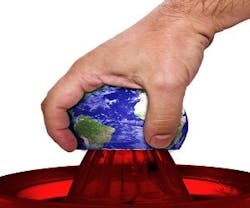Green Grabbing: The Dark Side of the Green Movement
'Green grabbing' - the rapidly-growing appropriation of land and resources in the name of 'green ' biofuels, carbon offsetting schemes, conservation efforts and eco-tourism initiatives – is forcing people from their homelands and increasing poverty, new research has found.
Ecosystems being 'asset-stripped' for profit is likely to cause dispossession and further poverty amongst already-poor land and resource users, according to a set of 17 new research case studies from Africa, Asia and Latin America, published in a special issue of the Journal of Peasant Studies.
"Green grabs are the dark side of the green economy," says Professor Melissa Leach, director of the ESRC STEPS Centre. "If market-based mechanisms are to contribute to sustainable development and the building of economies that are not only green but also fair, then fostering an agenda focused on distribution, equity and justice in green market arrangements is vital."
This means including meaningful local engagement and consultation based on transparency, accountability and free, prior informed consent. Yet green markets cannot do it all. In the rush to repair a damaged nature through trading and offset schemes, the political-economic structures that caused the damage in the first place must not be neglected.
Examples of green grabs include: in Guatemala, conservation agencies, ecotourism companies and the military are 'protecting' the Guatemalan Maya Biosphere Reserve as a 'Maya-themed vacationland', violently excluding local people. In Eastern and Southern Africa, businesses are revaluing soil systems and farming practices for 'biochar', dispossessing farmers and pastoralists from land and resources important for their livelihoods. Meanwhile evidence is mounting that some Reduced Emissions from Deforestation and Degradation (REDD and REDD+) schemes are dispossessing local forest users of vital resource access.
